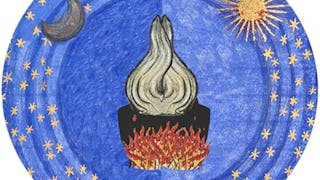- Browse
- Anthropology
Anthropology Courses
Anthropology courses can help you learn cultural analysis, social structures, human evolution, and ethnographic research methods. You can build skills in critical thinking, qualitative research, and cross-cultural communication. Many courses introduce tools like qualitative data analysis software and fieldwork techniques, that support gathering and interpreting data about human behavior and societies. You'll also explore key topics such as globalization, kinship systems, and the impact of technology on culture.
Popular Anthropology Courses and Certifications
 Status: Free TrialFree TrialR
Status: Free TrialFree TrialRRice University
Skills you'll gain: Ancient History, Scientific Methods, Anthropology, Investigation, Research, Social Sciences, Qualitative Research, Science and Research, World History, Research Methodologies, Data Collection, Cultural Diversity, Ethical Standards And Conduct
4.8·Rating, 4.8 out of 5 stars25 reviewsBeginner · Course · 1 - 4 Weeks
 Status: PreviewPreviewY
Status: PreviewPreviewYYale University
Skills you'll gain: Psychology, Research, Anthropology, Ethical Standards And Conduct, Cultural Diversity, Social Sciences, Sociology, Empathy & Emotional Intelligence, Political Sciences, Child Development
4.8·Rating, 4.8 out of 5 stars3.4K reviewsMixed · Course · 1 - 3 Months
 Status: PreviewPreviewU
Status: PreviewPreviewUUniversity of Pennsylvania
Skills you'll gain: Sociology, Social Sciences, Social Impact, Culture, Public Policies, Behavioral Economics, Surveys, Program Evaluation, Qualitative Research, Data Collection, Survey Creation, Research
4.6·Rating, 4.6 out of 5 stars2.1K reviewsBeginner · Course · 1 - 4 Weeks
 Status: PreviewPreviewU
Status: PreviewPreviewUUniversiteit Leiden
Skills you'll gain: Language Competency, Language Learning, Anthropology, English Language, Communication Disorders, Cultural Diversity, Interviewing Skills, Vocabulary, Grammar, Social Sciences, Sociology, Research Methodologies
4.7·Rating, 4.7 out of 5 stars2.5K reviewsBeginner · Course · 1 - 3 Months
 Status: PreviewPreviewU
Status: PreviewPreviewUUniversitat de Barcelona
Skills you'll gain: European History, World History, Art History, Research, Investigation, Cultural Diversity, Anthropology
4.6·Rating, 4.6 out of 5 stars1.8K reviewsBeginner · Course · 1 - 3 Months
 Status: Free TrialFree TrialR
Status: Free TrialFree TrialRRice University
Skills you'll gain: Biology, Environment, Microbiology, Environmental Science, Life Sciences, Environmental Issue, Sustainable Development, Natural Resource Management, Physiology, Molecular Biology, Taxonomy, Cell Biology, Anatomy, Climate Change Adaptation, Estimation, Scientific Methods, Climate Change Mitigation, Experimentation
4.8·Rating, 4.8 out of 5 stars273 reviewsBeginner · Specialization · 3 - 6 Months
What brings you to Coursera today?
 Status: Free TrialFree TrialR
Status: Free TrialFree TrialRRice University
Skills you'll gain: Ancient History, Timelines, Social Impact, Scientific Methods, Social Justice, World History, Anthropology, Social Sciences, Sustainable Development, Environment, Case Studies, General Science and Research, Environmental Science, Community Development, Climate Change Programs, Spatial Analysis, Geographic Information Systems, Research, Investigation, Data Analysis
4.6·Rating, 4.6 out of 5 stars33 reviewsBeginner · Specialization · 3 - 6 Months
 Status: Free TrialFree TrialU
Status: Free TrialFree TrialUUniversity of Colorado Boulder
Skills you'll gain: Molecular Biology, Biochemistry, Human Development, Biology, Life Sciences, Environment, Chemistry, Cell Biology, Environmental Issue, Child Development, Environmental Science, Environmental Resource Management, Music, Biotechnology, General Science and Research, Decision Making, Natural Resource Management, Liberal Arts, Oncology, Sustainable Development
4.5·Rating, 4.5 out of 5 stars385 reviewsBeginner · Specialization · 3 - 6 Months
 Status: Free TrialFree TrialR
Status: Free TrialFree TrialRRice University
Skills you'll gain: Human Musculoskeletal System, Anatomy, Endocrinology, Orthopedics, Kinesiology, Physiology, Neurology, Medical Terminology, Cell Biology, Biology, Chemistry, Clinical Practices, Sports Medicine, Physical Therapy, Molecular, Cellular, and Microbiology, Life Sciences, Lifelong Learning
4.7·Rating, 4.7 out of 5 stars164 reviewsIntermediate · Specialization · 3 - 6 Months
 Status: PreviewPreviewU
Status: PreviewPreviewUUniversity of Pennsylvania
Skills you'll gain: Ancient History, Liberal Arts, Ethical Standards And Conduct, Research, European History, World History, Anthropology, Political Sciences, Psychology
4.8·Rating, 4.8 out of 5 stars762 reviewsMixed · Course · 1 - 3 Months
 Status: PreviewPreviewT
Status: PreviewPreviewTThe University of Chicago
Skills you'll gain: Neurology, Physiology, Anatomy, Behavioral Health, Mental and Behavioral Health, Mental Health Diseases and Disorders, Vital Signs, Control Systems, Coordination, Biology, Communication Systems
4.9·Rating, 4.9 out of 5 stars3.2K reviewsBeginner · Course · 1 - 3 Months
 Status: PreviewPreviewU
Status: PreviewPreviewUUniversity of Pennsylvania
Skills you'll gain: Ancient History, Art History, Liberal Arts, Cultural Diversity, World History, Performing Arts, Anthropology, Sociology, Psychology
4.8·Rating, 4.8 out of 5 stars2.6K reviewsMixed · Course · 1 - 3 Months
In summary, here are 10 of our most popular anthropology courses
- Introduction to Archaeology: Knowing The Past: Rice University
- Moralities of Everyday Life: Yale University
- Social Norms, Social Change I: University of Pennsylvania
- Miracles of Human Language: An Introduction to Linguistics: Universiteit Leiden
- Magic in the Middle Ages: Universitat de Barcelona
- Introduction to Biology: Ecology, Evolution, & Biodiversity: Rice University
- Introduction to Archaeology: Rice University
- Biology Everywhere: University of Colorado Boulder
- Human Anatomy & Physiology I: Rice University
- Ancient Philosophy: Aristotle and His Successors: University of Pennsylvania
Frequently Asked Questions about Anthropology
Anthropology is the study of humans, their societies, cultures, and development throughout history. It is important because it provides insights into the diverse ways of life, beliefs, and practices that shape human experiences. By understanding cultural differences and similarities, anthropology fosters empathy and promotes social cohesion, making it a vital field in today's interconnected world.
Jobs in anthropology can vary widely, ranging from academic positions to roles in government, non-profits, and private sectors. Common career paths include cultural anthropologist, archaeologist, museum curator, and social researcher. Additionally, anthropologists often work in fields such as public health, education, and international development, where their skills in understanding human behavior and cultural contexts are invaluable.
To succeed in anthropology, you should develop a range of skills, including critical thinking, research methodologies, and effective communication. Understanding qualitative and quantitative research techniques is essential, as is the ability to analyze and interpret data. Additionally, cultural sensitivity and adaptability are crucial, as anthropologists often work in diverse environments and with various communities.
Some of the best online anthropology courses focus on cultural anthropology, archaeology, and social anthropology. These courses often cover foundational theories and contemporary issues. You can explore options that fit your interests and schedule, allowing you to learn at your own pace while gaining valuable insights into human societies.
Yes. You can start learning anthropology on Coursera for free in two ways:
- Preview the first module of many anthropology courses at no cost. This includes video lessons, readings, graded assignments, and Coursera Coach (where available).
- Start a 7-day free trial for Specializations or Coursera Plus. This gives you full access to all course content across eligible programs within the timeframe of your trial.
If you want to keep learning, earn a certificate in anthropology, or unlock full course access after the preview or trial, you can upgrade or apply for financial aid.
To learn anthropology, start by exploring introductory courses that cover the basics of the field. Engage with course materials, participate in discussions, and apply what you learn through projects or fieldwork. Reading anthropological texts and articles can also deepen your understanding. Consider joining online forums or study groups to connect with others interested in anthropology.
Anthropology courses typically cover a range of topics, including cultural practices, social structures, human evolution, and archaeological methods. You may also study specific themes such as globalization, migration, and identity. These topics help you understand the complexities of human behavior and societal development across different cultures.
For training and upskilling employees, anthropology courses that focus on cultural competence, diversity, and social dynamics are particularly beneficial. These courses can enhance understanding of workplace diversity and improve communication skills among teams. Exploring courses that address these themes can empower employees to navigate multicultural environments effectively.










